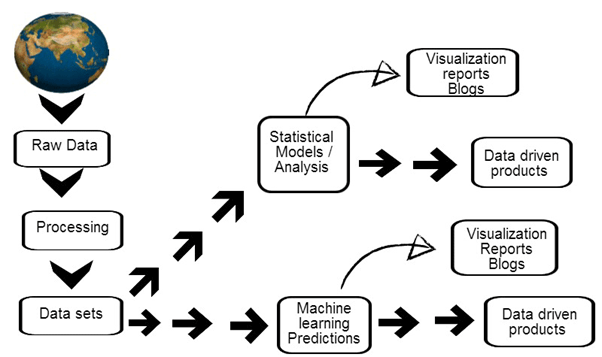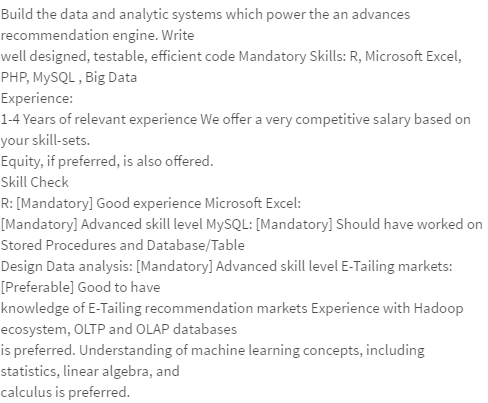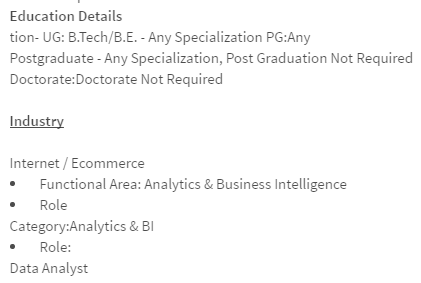Edvancer's Knowledge Hub
How can an engineering fresher get into analytics[Part 1]
![How can an engineering fresher get into analytics.[ Part 1]](https://edvancer.in/wp-content/uploads/2016/10/Sudent-738x492.jpg)
“I am a fresh engineering graduate, how can I start a career in data analytics?”
Every fresh graduate interested in the analytics industry has this one question on their mind. Analytics is one of the fastest growing industries in the world today. The demand so vastly surpasses the supply of data analysts that companies find it difficult to hire trained professionals in analytics. But, as a fresh graduate how do you crack this industry? Various job descriptions like data scientist, business analyst or big data architect might be confusing you. Do not get clouded by different job titles given by companies. In reality, there are just two paths you can take as a fresh BTech grad in this industry:- The data analytics path, and
- The data engineering path
Subscribe to our business analytics course now!
Now, let’s see what skill sets are needed to get an entry level job in this field. Knowledge of basic problem solving Companies ask puzzles like this to test your number crunching and logical thinking ability: “How do you cut a circular birthday cake in 8 equal pieces in exactly 3 cuts?” Or “You have two jugs – one of 4 liters and the other of 5 liters. You need to pour exactly 7 liters of water in a bucket. How will you do it?” Employers assess you on how you solve these problems, but they care more about the way in which you approach these problems, rather the solution. Gurmeet.in and the book called “My Best Mathematical and Logical Puzzles” has a lot of analytical puzzles. You can browse through them to be more prepared for such puzzles. Basics of statistics You need to have a basic knowledge of statistical concepts like p-value, hypothesis testing, sampling, experimental design, etc. I would highly recommend you implement these concepts using R, Python, SAS or any statistical tool on small data sets, so that you practically learn how statistics is used in data analytics. By doing this, you will have an edge over other candidates who just have a theoretical understanding of these concepts. SQL SQL is the (essentially universal) language of relational databases in which most structured data is stored. Most data analytics professionals spend their time writing SQL scripts to retrieve data from relational databases. So you won’t see a job description without a mention of SQL in it. Have a portfolio of projects Once you get a good hold of the above skills, you need to work on data analytics projects right from scratch. By volume, 80 percent of the data out there is untapped and much of it is unstructured – too messy and just too complex to crack open. Companies are looking for analytics professionals who understand the entire data science process: You need to do projects that expose you to this complete cycle, and work on data analytics projects right from scratch. You collate data and clean it to create a dataset that can be analyzed, then you try to make predictions or generate insights from the dataset using statistical and machine learning models, and try to explain them in reports or dashboards. Do 4-5 projects so that you get an in-depth understanding of this complete process.
Make sure you do all these projects using either R or Python or SAS – these are three most popular programming languages in data science.
What companies and job roles should you target?
If you reach the end of this stage, I think a major part of your work is done. Now, it’s time for job hunting.
People would suggest you get an internship and then look for a job – don’t listen to them. If you have all the skills that we have discussed and a good portfolio of projects, then you don’t have to get an internship first, you can directly apply for full-time jobs.
Even though you are a fresh graduate, apply for jobs that require 1 -2 years of experience. Read the job description carefully and look for what skills the job requires.
Let’s take this job description as an example:
You need to do projects that expose you to this complete cycle, and work on data analytics projects right from scratch. You collate data and clean it to create a dataset that can be analyzed, then you try to make predictions or generate insights from the dataset using statistical and machine learning models, and try to explain them in reports or dashboards. Do 4-5 projects so that you get an in-depth understanding of this complete process.
Make sure you do all these projects using either R or Python or SAS – these are three most popular programming languages in data science.
What companies and job roles should you target?
If you reach the end of this stage, I think a major part of your work is done. Now, it’s time for job hunting.
People would suggest you get an internship and then look for a job – don’t listen to them. If you have all the skills that we have discussed and a good portfolio of projects, then you don’t have to get an internship first, you can directly apply for full-time jobs.
Even though you are a fresh graduate, apply for jobs that require 1 -2 years of experience. Read the job description carefully and look for what skills the job requires.
Let’s take this job description as an example:

 R, MyQL and Excel are mandatory skills for this job. They are also looking for candidates who have a good knowledge of web based recommender systems. If you have done a project in web based recommender systems using R, and if you know the basic concepts in machine learning, then you would have an advantage over other candidates.
Conclusion:
I understand that this is a lot of information to process.
The entire process might be overwhelming for you. For instance, you might not know what concepts in SQL and statistics you should learn, what are the frequently asked logical puzzles in the analytics interviews or R programming, etc.
That’s why you need to take a good online course in data analytics. A good analytics course will provide you with only the necessary concepts you need to know in a particular analytics topic, instead of overwhelming you. These courses will also explain analytics concepts in a simple way to you, while also demonstrate how these concepts are implemented in a series of projects, which will make your learning process effective, easier and hassle-free.
If you found this post useful, don’t forget to hit the share button and share the knowledge with a friend!
R, MyQL and Excel are mandatory skills for this job. They are also looking for candidates who have a good knowledge of web based recommender systems. If you have done a project in web based recommender systems using R, and if you know the basic concepts in machine learning, then you would have an advantage over other candidates.
Conclusion:
I understand that this is a lot of information to process.
The entire process might be overwhelming for you. For instance, you might not know what concepts in SQL and statistics you should learn, what are the frequently asked logical puzzles in the analytics interviews or R programming, etc.
That’s why you need to take a good online course in data analytics. A good analytics course will provide you with only the necessary concepts you need to know in a particular analytics topic, instead of overwhelming you. These courses will also explain analytics concepts in a simple way to you, while also demonstrate how these concepts are implemented in a series of projects, which will make your learning process effective, easier and hassle-free.
If you found this post useful, don’t forget to hit the share button and share the knowledge with a friend!
Manu Jeevan
Manu Jeevan is a self-taught data scientist and loves to explain data science concepts in simple terms. You can connect with him on LinkedIn, or email him at manu@bigdataexaminer.com.
Latest posts by Manu Jeevan (see all)
- Python IDEs for Data Science: Top 5 - January 19, 2019
- The 5 exciting machine learning, data science and big data trends for 2019 - January 19, 2019
- A/B Testing Made Simple – Part 2 - October 30, 2018
Follow us on
Free Data Science & AI Starter Course

